-
 Bitcoin
Bitcoin $105,147.6106
-0.49% -
 Ethereum
Ethereum $2,616.0115
0.17% -
 Tether USDt
Tether USDt $1.0003
-0.03% -
 XRP
XRP $2.2136
-2.02% -
 BNB
BNB $666.3018
0.21% -
 Solana
Solana $154.0739
-1.39% -
 USDC
USDC $0.9998
0.00% -
 Dogecoin
Dogecoin $0.1896
-2.72% -
 TRON
TRON $0.2748
1.56% -
 Cardano
Cardano $0.6715
-3.45% -
 Hyperliquid
Hyperliquid $36.2530
-1.45% -
 Sui
Sui $3.1831
-2.82% -
 Chainlink
Chainlink $13.8800
-3.01% -
 Avalanche
Avalanche $20.1716
-5.95% -
 UNUS SED LEO
UNUS SED LEO $9.1016
1.22% -
 Stellar
Stellar $0.2680
-2.39% -
 Bitcoin Cash
Bitcoin Cash $402.1219
-0.56% -
 Toncoin
Toncoin $3.1923
-0.14% -
 Shiba Inu
Shiba Inu $0.0...01293
-1.59% -
 Hedera
Hedera $0.1686
-2.91% -
 Litecoin
Litecoin $88.6708
-2.13% -
 Polkadot
Polkadot $4.0412
-3.73% -
 Monero
Monero $317.8105
-7.94% -
 Ethena USDe
Ethena USDe $1.0012
-0.01% -
 Bitget Token
Bitget Token $4.7500
-1.37% -
 Dai
Dai $1.0000
0.00% -
 Pepe
Pepe $0.0...01198
-3.31% -
 Pi
Pi $0.6478
-0.13% -
 Aave
Aave $264.6110
-0.06% -
 Uniswap
Uniswap $6.3405
-5.11%
Why do some cryptocurrency wallets require identity verification?
Cryptocurrency wallets may require identity verification to comply with regulations, enhance security, and integrate with traditional finance, balancing user privacy with compliance needs.
Apr 04, 2025 at 11:00 pm

Cryptocurrency wallets are digital tools that allow users to store, send, and receive cryptocurrencies. While many wallets operate with a high degree of anonymity, some require identity verification, a process often referred to as Know Your Customer (KYC) compliance. This article will delve into the reasons behind this requirement, exploring the benefits and implications for users and the broader cryptocurrency ecosystem.
Regulatory Compliance
One of the primary reasons some cryptocurrency wallets require identity verification is to comply with regulatory standards. Governments and financial regulatory bodies worldwide have been increasingly focused on preventing money laundering, terrorist financing, and other illicit activities. By implementing KYC procedures, wallet providers can adhere to these regulations and avoid legal repercussions.
Anti-Money Laundering (AML) Laws: These laws mandate financial institutions to monitor and report suspicious activities. Cryptocurrency wallets that comply with AML laws help in tracking and preventing the misuse of digital currencies for illegal purposes.
Counter-Terrorist Financing (CTF) Regulations: Similar to AML, CTF regulations aim to prevent funds from being used to support terrorism. Identity verification helps in identifying and blocking transactions that might be linked to terrorist activities.
Financial Action Task Force (FATF) Recommendations: The FATF, an intergovernmental body, sets standards to combat money laundering and terrorist financing. Many countries adopt these recommendations, which include KYC and due diligence requirements for cryptocurrency service providers.
Enhancing Security and Trust
Identity verification also plays a crucial role in enhancing the security and trust within the cryptocurrency ecosystem. By verifying the identities of their users, wallet providers can offer a more secure environment, reducing the risk of fraud and unauthorized access.
Preventing Fraud: Verified identities make it harder for malicious actors to create multiple accounts and engage in fraudulent activities. This helps protect both the wallet provider and its users from scams and theft.
Building Trust: When users know that a wallet provider adheres to strict identity verification processes, they are more likely to trust the platform with their funds. This can lead to increased user adoption and a more robust ecosystem.
Reducing Risk of Hacks: Identity verification can help in quickly identifying and responding to security breaches. If a user's identity is verified, it becomes easier to trace and mitigate the impact of unauthorized access.
Facilitating Integration with Traditional Financial Systems
Another reason for identity verification in cryptocurrency wallets is to facilitate integration with traditional financial systems. As cryptocurrencies gain more acceptance, the ability to seamlessly interact with banks and other financial institutions becomes increasingly important.
Banking Partnerships: Many banks are hesitant to work with cryptocurrency platforms that do not adhere to KYC standards. By implementing identity verification, wallet providers can establish partnerships with banks, enabling users to convert cryptocurrencies to fiat currencies more easily.
Fiat On-Ramps and Off-Ramps: Identity verification is often required to use services that allow users to deposit or withdraw fiat currencies. This integration is crucial for users who need to move funds between traditional and digital financial systems.
Compliance with Payment Processor Requirements: Payment processors often require identity verification to process transactions. By complying with these requirements, wallet providers can offer more payment options to their users.
Enhancing User Experience and Features
Identity verification can also lead to an enhanced user experience and the availability of additional features. While some users may prefer anonymity, others value the benefits that come with verified accounts.
Higher Transaction Limits: Verified users often have access to higher transaction limits, allowing them to send and receive larger amounts of cryptocurrencies.
Access to Advanced Features: Some wallets offer advanced features, such as margin trading, staking, and lending, which may only be available to verified users. These features can provide additional earning opportunities and enhance the overall utility of the wallet.
Customer Support: Verified users may receive better customer support, as wallet providers can more easily verify their identities and assist with account-related issues.
Balancing Privacy and Compliance
While identity verification offers several benefits, it also raises concerns about privacy. Cryptocurrency users value their anonymity, and the requirement for identity verification can be seen as a trade-off between privacy and compliance.
Privacy Concerns: Users may be reluctant to provide personal information, fearing that it could be misused or compromised. Wallet providers must implement robust security measures to protect user data and maintain trust.
Regulatory Variations: Different countries have varying regulatory requirements, which can complicate the implementation of identity verification. Wallet providers must navigate these differences to offer a consistent user experience across regions.
Alternative Solutions: Some wallet providers offer tiered systems, where users can choose between different levels of verification. This allows users to balance their privacy needs with the benefits of verification.
Impact on Cryptocurrency Adoption
The requirement for identity verification can have both positive and negative impacts on the adoption of cryptocurrencies. While it may deter some users who value anonymity, it can also attract others who prioritize security and regulatory compliance.
Attracting Institutional Investors: Institutional investors, such as hedge funds and pension funds, often require strict compliance with KYC and AML regulations. By implementing identity verification, wallet providers can attract these investors, potentially increasing the overall adoption of cryptocurrencies.
User Education: The process of identity verification can serve as an educational tool, helping users understand the importance of regulatory compliance and security in the cryptocurrency space.
Market Segmentation: The requirement for identity verification can lead to market segmentation, with different wallets catering to different user preferences. Some wallets may focus on privacy and anonymity, while others prioritize compliance and security.
The Future of Identity Verification in Cryptocurrency Wallets
As the cryptocurrency industry continues to evolve, the role of identity verification is likely to become even more significant. Technological advancements and regulatory developments will shape the future of KYC in cryptocurrency wallets.
Blockchain-Based Solutions: Some companies are exploring blockchain-based solutions for identity verification, which could offer a more secure and decentralized approach to KYC. These solutions could potentially address privacy concerns while still meeting regulatory requirements.
Global Regulatory Harmonization: Efforts to harmonize cryptocurrency regulations globally could lead to more consistent identity verification requirements across different jurisdictions. This could simplify the process for wallet providers and users alike.
User-Centric Approaches: Wallet providers may increasingly adopt user-centric approaches to identity verification, offering more flexible and customizable options to meet the diverse needs of their users.
Common Questions and Answers
Q:
A: Some cryptocurrency wallets require identity verification to comply with regulatory standards, enhance security and trust, facilitate integration with traditional financial systems, and offer enhanced user experiences and features.
Q: What are the benefits of identity verification for cryptocurrency wallet users?
A: Benefits include higher transaction limits, access to advanced features, better customer support, and increased security and trust within the ecosystem.
Q: Are there any privacy concerns associated with identity verification in cryptocurrency wallets?
A: Yes, users may be concerned about the potential misuse or compromise of their personal information. Wallet providers must implement robust security measures to address these concerns.
Q: How does identity verification impact the adoption of cryptocurrencies?
A: It can attract institutional investors and educate users about the importance of regulatory compliance and security. However, it may also deter users who value anonymity, leading to market segmentation.
Q: What does the future hold for identity verification in cryptocurrency wallets?
A: The future may involve blockchain-based solutions, global regulatory harmonization, and more user-centric approaches to identity verification, balancing privacy and compliance needs.
Disclaimer:info@kdj.com
The information provided is not trading advice. kdj.com does not assume any responsibility for any investments made based on the information provided in this article. Cryptocurrencies are highly volatile and it is highly recommended that you invest with caution after thorough research!
If you believe that the content used on this website infringes your copyright, please contact us immediately (info@kdj.com) and we will delete it promptly.
- Top 30 Market Cap Incoming? Unstaked’s $0.1819 Launch Math Leaves SHIB and Chainlink Behind
- 2025-06-05 09:55:13
- Stablecoins Usher in a "WhatsApp Moment" in the Currency Field: PANews
- 2025-06-05 09:55:13
- Cryptocurrency market capitalization declines 1.7% to $3.29T, Bitcoin dips to $100.5k before recovering to $102.7k
- 2025-06-05 09:50:12
- Pi Network Drops by 25.7%, Ending Its Upward Streak That Brought the Token's Price over the $1 Threshold
- 2025-06-05 09:50:12
- USDC Issuer Circle Internet Group Launches Stablecoin Settlement Network, Excluding All Korean Companies
- 2025-06-05 09:45:13
- SUI drops 5% to $3.84 as a rising wedge pattern forms. Will it break down to $3.13 or rally to $5.40?
- 2025-06-05 09:45:13
Related knowledge
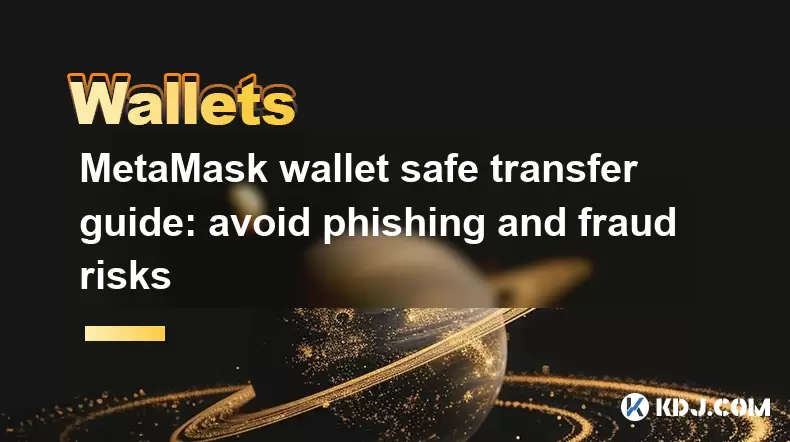
MetaMask wallet safe transfer guide: avoid phishing and fraud risks
Jun 04,2025 at 01:49pm
In the world of cryptocurrencies, securing your digital assets is paramount. One popular tool for managing your cryptocurrencies is MetaMask, a browser extension and mobile app that allows you to interact with the Ethereum blockchain. However, with the rise in popularity of MetaMask, there has also been an increase in phishing and fraud attempts targeti...
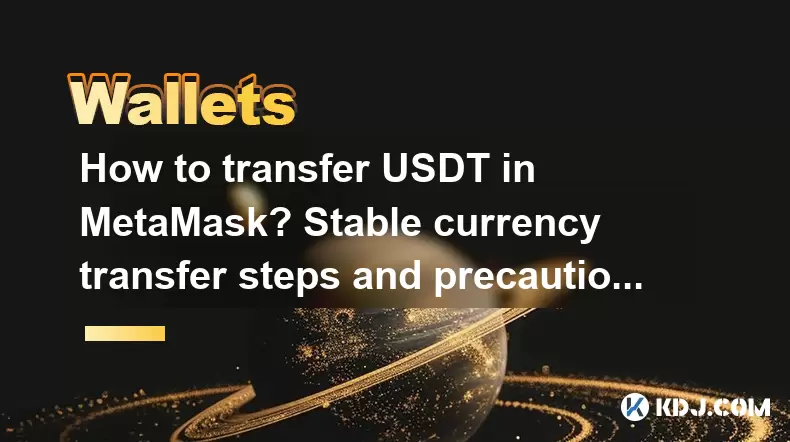
How to transfer USDT in MetaMask? Stable currency transfer steps and precautions
Jun 04,2025 at 07:28pm
Transferring USDT (Tether) within the MetaMask wallet involves several steps and requires careful attention to detail to ensure the transaction goes smoothly. In this article, we will guide you through the process of transferring USDT using MetaMask, highlighting important steps and precautions to keep in mind. Understanding USDT and MetaMaskUSDT, or Te...
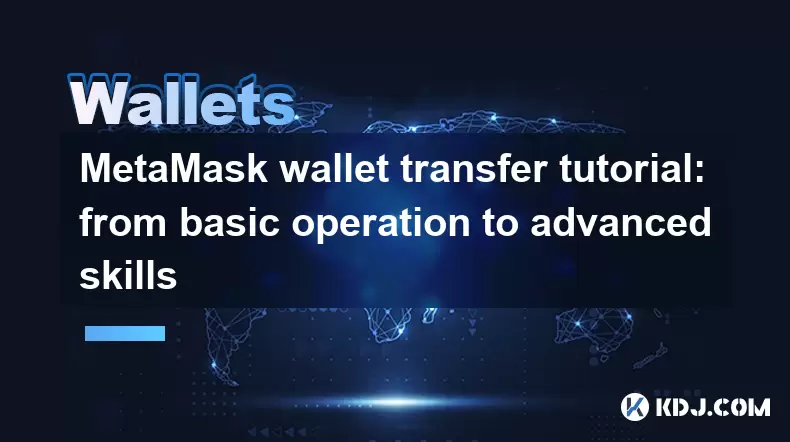
MetaMask wallet transfer tutorial: from basic operation to advanced skills
Jun 02,2025 at 01:50pm
MetaMask is a popular cryptocurrency wallet that allows users to manage their digital assets on the Ethereum blockchain and other compatible networks. This tutorial will guide you through the basic operations of transferring funds with MetaMask, as well as delve into more advanced skills to enhance your experience. Setting Up Your MetaMask WalletBefore ...
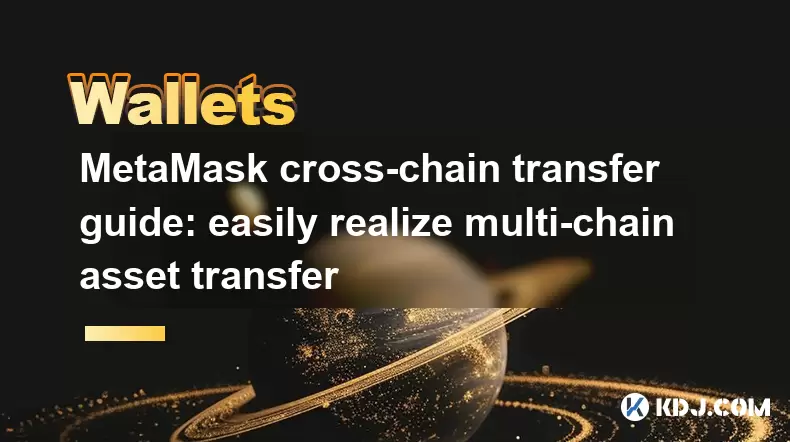
MetaMask cross-chain transfer guide: easily realize multi-chain asset transfer
Jun 02,2025 at 09:28pm
MetaMask is a popular cryptocurrency wallet that supports a variety of blockchain networks, making it an ideal choice for users looking to manage their assets across multiple chains. In this guide, we will walk you through the process of performing cross-chain transfers using MetaMask, ensuring you can easily realize multi-chain asset transfer. Understa...

How to transfer money in MetaMask wallet? Tutorial on internal transfer and cross-chain operation
Jun 03,2025 at 07:21pm
Transferring money within the MetaMask wallet can be essential for managing your cryptocurrency assets efficiently. Whether you're looking to move funds between your own accounts or send them to another user, understanding the process is crucial. This tutorial will guide you through the steps for internal transfers within the same blockchain and cross-c...
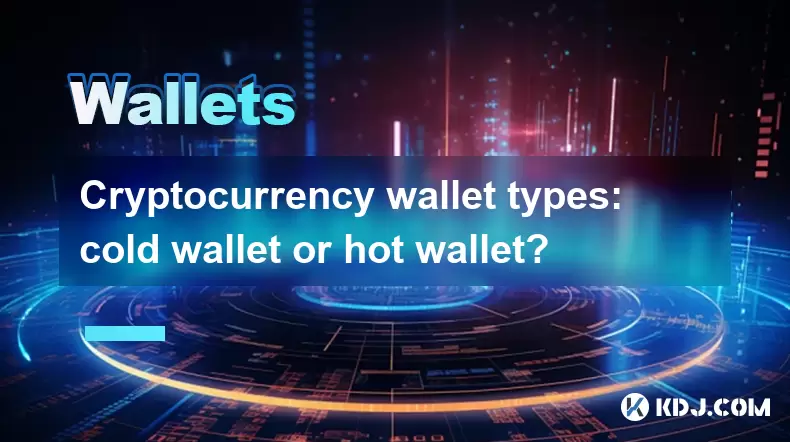
Cryptocurrency wallet types: cold wallet or hot wallet?
May 30,2025 at 02:01pm
Cryptocurrency wallets are essential tools for managing and securing your digital assets. When it comes to choosing a wallet, one of the key decisions you'll face is whether to opt for a cold wallet or a hot wallet. Each type has its own set of advantages and drawbacks, and understanding these can help you make an informed decision that best suits your ...

MetaMask wallet safe transfer guide: avoid phishing and fraud risks
Jun 04,2025 at 01:49pm
In the world of cryptocurrencies, securing your digital assets is paramount. One popular tool for managing your cryptocurrencies is MetaMask, a browser extension and mobile app that allows you to interact with the Ethereum blockchain. However, with the rise in popularity of MetaMask, there has also been an increase in phishing and fraud attempts targeti...

How to transfer USDT in MetaMask? Stable currency transfer steps and precautions
Jun 04,2025 at 07:28pm
Transferring USDT (Tether) within the MetaMask wallet involves several steps and requires careful attention to detail to ensure the transaction goes smoothly. In this article, we will guide you through the process of transferring USDT using MetaMask, highlighting important steps and precautions to keep in mind. Understanding USDT and MetaMaskUSDT, or Te...

MetaMask wallet transfer tutorial: from basic operation to advanced skills
Jun 02,2025 at 01:50pm
MetaMask is a popular cryptocurrency wallet that allows users to manage their digital assets on the Ethereum blockchain and other compatible networks. This tutorial will guide you through the basic operations of transferring funds with MetaMask, as well as delve into more advanced skills to enhance your experience. Setting Up Your MetaMask WalletBefore ...

MetaMask cross-chain transfer guide: easily realize multi-chain asset transfer
Jun 02,2025 at 09:28pm
MetaMask is a popular cryptocurrency wallet that supports a variety of blockchain networks, making it an ideal choice for users looking to manage their assets across multiple chains. In this guide, we will walk you through the process of performing cross-chain transfers using MetaMask, ensuring you can easily realize multi-chain asset transfer. Understa...

How to transfer money in MetaMask wallet? Tutorial on internal transfer and cross-chain operation
Jun 03,2025 at 07:21pm
Transferring money within the MetaMask wallet can be essential for managing your cryptocurrency assets efficiently. Whether you're looking to move funds between your own accounts or send them to another user, understanding the process is crucial. This tutorial will guide you through the steps for internal transfers within the same blockchain and cross-c...

Cryptocurrency wallet types: cold wallet or hot wallet?
May 30,2025 at 02:01pm
Cryptocurrency wallets are essential tools for managing and securing your digital assets. When it comes to choosing a wallet, one of the key decisions you'll face is whether to opt for a cold wallet or a hot wallet. Each type has its own set of advantages and drawbacks, and understanding these can help you make an informed decision that best suits your ...
See all articles























































































